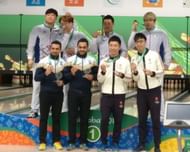“You’re a bowler? Oh, you mean you represent the country in cricket, can I click a picture with you?”
“Asian Games? You’re going for the Asian Games, I didn’t know that cricket was included in that tournament.”
These are some of the generic statements that India’s professional ten-pin bowling team has to deal with on a daily basis.
Despite the consistent apathy, the Indian squad successfully won their first ever medal at a multi-sport event by defeating the Philippines in the bronze medal match, 418 – 406, at the ongoing Asian Indoor Games in Ashgabat.
The duo of Shabbir Asgarali Dhankot and Dhruv Sarda created history earlier this week, exactly three years after the Sports Ministry decided not to send the squad to the 2014 Asian Games, citing the reason that ‘bowling isn’t considered a sport in India’.
Heartbreak before Asian Games
Speaking exclusively to Sportskeeda in Ashgabat, bronze medal winner Dhruv said, “We were broken. The Bowling Federation of India got us on board as early as 2009, keeping the target of the 2014 Asian Games in mind. We trained every day, with the limited resources we had. We weren’t paid a salary but the Federation paid for all our expenses -- from tickets to equipment, which is expensive."
"Just two days before the event, which was September 17 -- I can never forget that day! Just two days before the tournament, we were told that we can’t go because we aren’t an official sport. It broke us! We all wanted to quit as this was something we had worked all our lives for. But thankfully, we stuck on and we can see this day.”
A huge difference in exposure and infrastructure can be discovered by delving into the lives of their bronze medal match opponents. Anton Alcazeren and Kenneth Chua from the Philippines are full-time bowlers, who earn a salary of $940 a month, apart from endorsements from local brands. In addition to participating on the Asian tour, the duo has competed in several tournaments in Europe, which included exposure tours to the United States of America (USA).
On the flipside, the Indian duo has not made a single penny till date through bowling, despite achieving similar results at the continental level. Shabbir won silver at the Asian Championship in 2015, which remains the country’s best individual performance till date. However, back home he can only dedicate a few days in a week to the sport.
He said, “Honestly, around 2013 I had to temporarily stop bowling to create my own business. I wasn’t simply being able to survive; we have to be practical, right? The things bowling taught me in life, things like discipline, hard work are something I carried on to my other professional career. I’m really thankful to Mr. Kannan Ramachandran, our General Secretary, for helping us through everything."
He added, "Although I’ve never earned any salary, I’ve never spent through my pocket to attend events. They have taken care of everything. The Asian Games is special, I took two months off to pursue my passion because I knew I might never get this chance ever again. We have been together, all four of us, for the past decade or so, and to finally win at this level, the feeling is surreal.”

The other two – Akaash Kumar and Parvez Ahmed, were a part of the quartet that was selected by the Tenpin Bowling Federation of India to represent the nation at the 2014 Asian Games. The idea was to train a youth team that could compete against the likes of South Korea, who are superstars in their home country.
I shook my head when I first saw them: Coach and former World Champion Andrew Frowley
Multiple-time World Champion Andrew Frowley, who has had two different stints at the sport’s highest level, the Pro Bowling Association (PBA), took on the job of coaching an amateur Indian team in 2012. He said, “Oh boy! That was one of the toughest times. I remember thinking to myself, ‘What have I gotten myself into?'
"I literally shook my head in disbelief. How do I get these guys to be competitive at the Asian Games, let alone help them medal? They were a young lot, who essentially learned the wrong technique from the very beginning.
"However, we dug deep and you know as long as you’re motivated, anything is possible. I really commend these boys; they have full-time jobs and still represent India at this level," he added.
"I mean, it’s not a joke. I have bowled at the highest level, and I promise you the Koreans here are the best in the world," he went on. "So you’re bowling at a level where these guys are playing against the best as well. For us, we get maybe one or two events in a year to play against Asia’s best, not only the world. This is huge and this just shows us how far we can go if we switch to full-time.”

A young unknown entity was ready to challenge Asia’s Goliaths on the world stage, pipetted by a former World Champion. However, those dreams were on the verge of being thwarted. Akaash said, “I still remember, we had packed our bags and we were pumping ourselves up. We weren’t looking for a medal, we weren’t looking for some success -- we were just looking to participate.
"I agree with the Ministry that we might not have even won a medal. But if your country has as many as 3000 bowlers, they do deserve representation. And to tell us that we aren’t a sport? I think this medal is somewhat of a statement to the Ministry!"
"If you send us for such tournaments, we will get results. Our next target is the 2018 Asian Games in Jakarta, that is where we will really announce ourselves. We are really thankful to our Federation for believing in us,” he added.
Stark difference in facilities with the world's best
The South Korean side which won both gold and silver in the doubles event have as many as 23 official training centers in Seoul itself. One of the winners Cho Young Seon is a superstar back home, with as many as 500,000 followers on social media. Bowling to South Korea is essentially what cricket is to India.
These are athletes who have annual contracts, are darlings of various corporate brands and most importantly are treated as ‘equal’ sportspersons when compared to sports such as football. Cho endorses as many as nine brands back home - everything ranging from snacks to bowling equipment, a far-fetched thought for the tenpin bowling team in India.
This begs the question: despite consistent achievements on the continental stage, why has a sport with a large player base such as bowling been denied legitimacy? The answer might lie in the way the sport is consumed in India.
Andrew said, “There is a massive difference in the way we consume bowling back home in Australia. The idea is to have as many bowlers fill your alleys on a consistent basis. You give them a membership at a cheaper rate so that they keep on coming."
"Here, the notion is far more recreational; you have families who probably come just once or twice a year, with little to no interest in coming back again. Hence, we need a training centre --- a national training centre that helps us train all budding players.
"You need to create a pyramid, a pyramid which has players at all levels. Not just at the top level; these guys need to be challenged and that needs to be done consistently.”
The Federation will now be sending an U-18 team to the Asian Championship for the very first time, and is also attempting to put a youth system in place. Regardless of the Ministry’s stance on tenpin bowling, the national team has surely left its mark on the nation’s sporting ecosystem.
